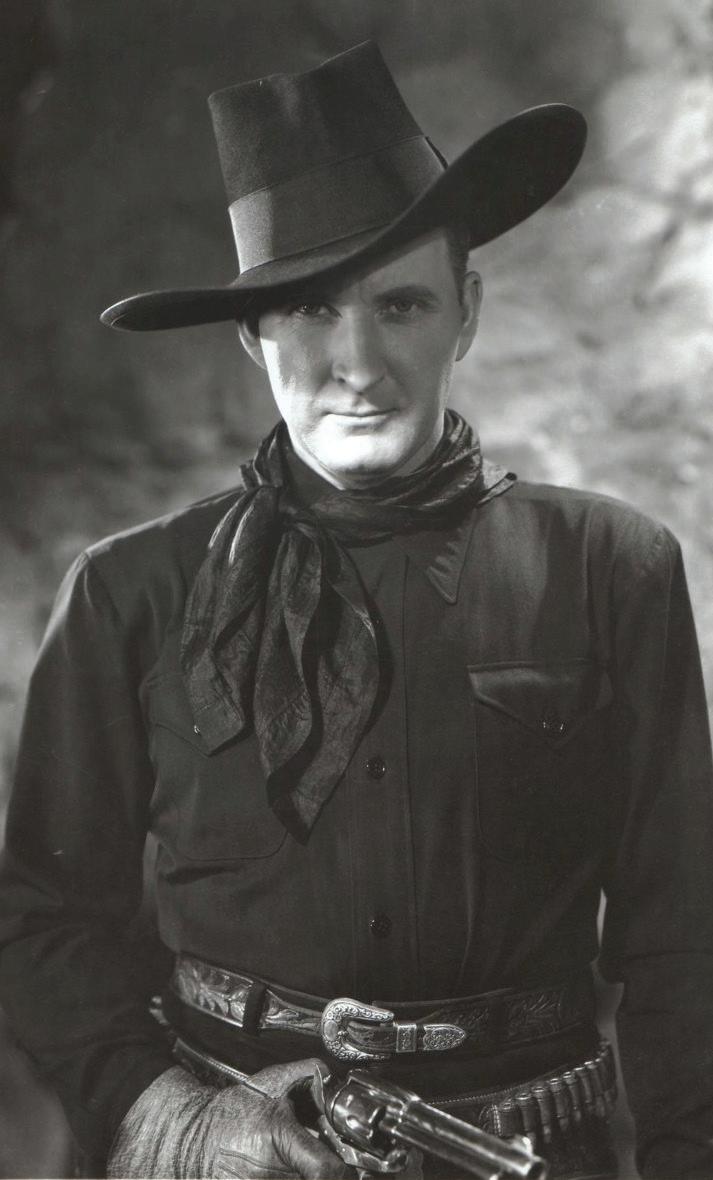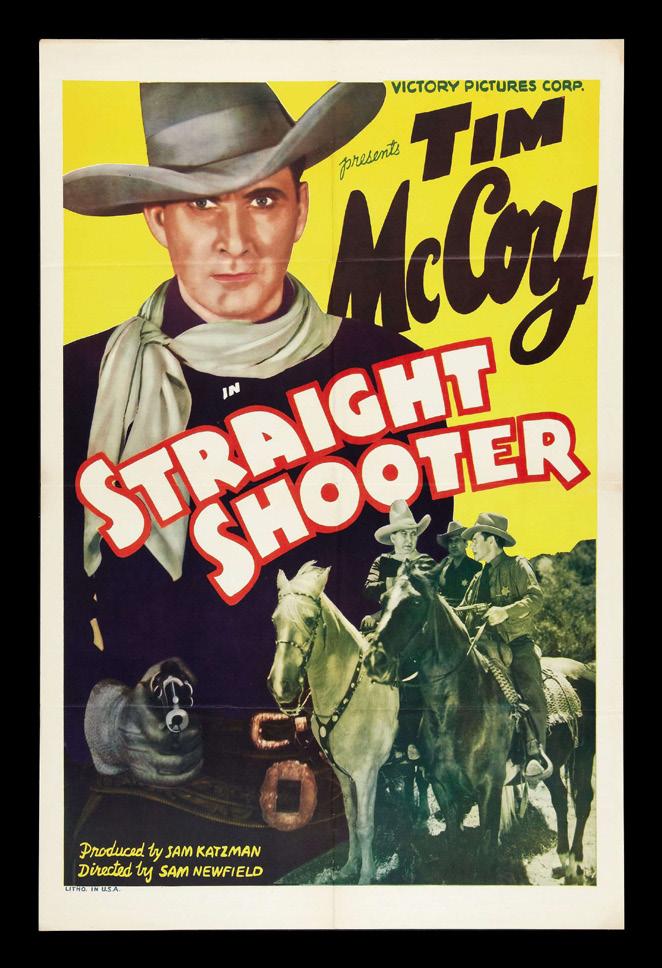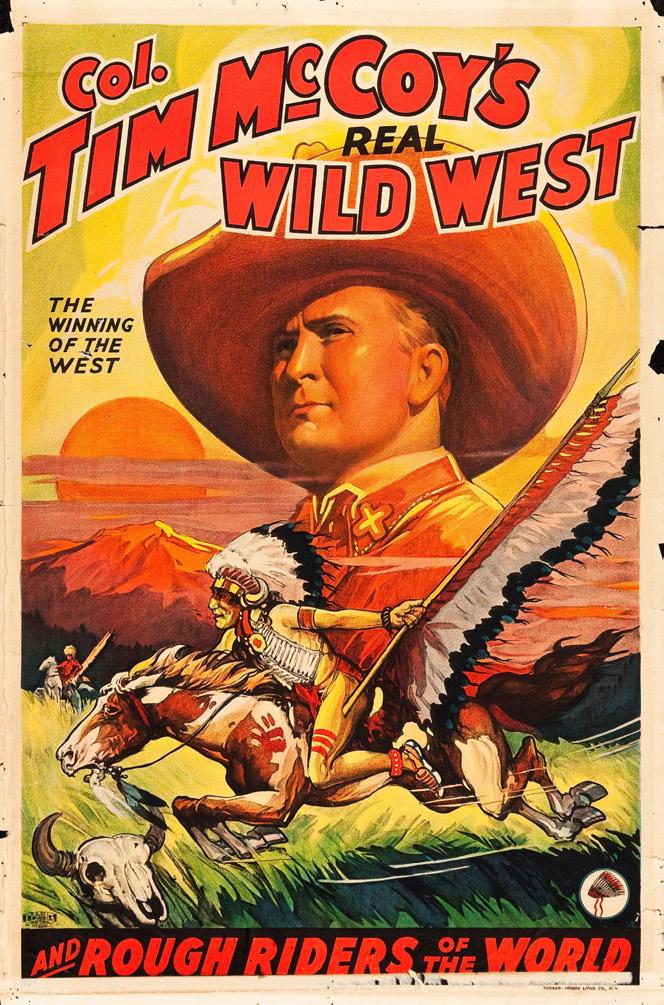
5 minute read
Tim McCoy, The Singing Cowboy
THE SINGING COWBOY: The "Reel" McCoy
Tim McCoy looks over his ranch, The Eagle’s Nest Courtesy of University of Wyoming, American Heritage Center, Tim McCoy Collection
Advertisement

It was 1910 in Hot Springs County and the spring roundup had begun. Tim McCoy was a newcomer to the area and had just been hired by Irish Tom, a well-liked local rancher. The young cowboy had joined an eclectic crew consisting of seven men: former outlaws, small time rustlers, hardened cowboys and a college graduate who had just returned home from back East.
The cattle were fresh off the range, half-wild and easily spooked. According to McCoy, if a man rode up quickly to the herd at night and stopped to light a cigarette, the flash of the match might frighten them and they’d be off and gone.
In order to keep the beeves from ‘getting edgy’, the cowboys would take shifts and sing as they rode the night circle. The hope was that the cattle would become comfortable with the sound and less likely to bolt.
“Cattle,” McCoy explained, “besides being spookable, are also pretty dumb. Let them eat, don’t cause them any bother and they’re fine.”
Most of the cowboys sang the only songs they knew but the Texas songs of “Sam Bass” and “Chisholm Trail” quickly grew old. When a chorus of “ky-yi, yippi-yippi-ay” rang out, the cowpunchers reacted by “chapping” the off-key offender. They took off their heavy leather chaps and whaled the poor guy half to death.
McCoy learned the lesson quickly and lent his tenor voice instead to the soft, lilting melodies he had heard his parents and their Irish friends singing during his childhood. Sometimes, if he was on McCoy learned the lesson quickly and lent his tenor voice instead to the soft, lilting melodies he had heard his parents and their Irish friends singing during his childhood. Sometimes, if he was on an early guard, the cowboys would stay awake and listen to him sing.
C’mon boys, and listen to my tale And I’ll tell ya ‘bout my troubles On the old Chrisholm Trail, Come a ky-yi, yippi-yippi-ay, yippi-ay Come a ky-yi, yippi-yippi-ay.
His voice also earned him his nickname.
“I was sitting around the fire one night at suppertime,” McCoy recalled, “when somebody asked who was on second guard.”
“Oh, Ted Price and the Canary,” came the reply from Irish Tom.
I looked up and said, “Wait a minute, I’m on guard with Ted Price!”

Frank James, former outlaw, looked at me and said, “Hain’t ya heerd yer name yet, young feller? You’re Irish Tom’s Canary.”
McCoy continued to sing for the cattle of other men for the next five years, rotating around the countryside and drifting from one ranch to the next. During this time, he would make trips to Cody and visit the Irma’s saloon where he would often find Buffalo Bill Cody. The old showman, then in his late 60’s, would regale his audience with stories of his exploits. Cody was a natural performer and his influence was reflected in McCoy’s decision to eventually head to Hollywood and one day have his own Wild West Show.
His ticket to Hollywood came in 1922 when McCoy was no longer singing for other men’s cattle. At the time, he was the youngest adjutant general in Wyoming’s history, ran 350 head of cattle on five hundred acres of land in the Owl Creeks Mountain Range, had three kids and, in his words, was "bored". When a producer came looking for Indians to star in an upcoming silent movie, The Covered Wagon, Tim McCoy agreed to help. By the time McCoy was in his forties, he had begun his own acting career in the popular western genre.
He started out in silent movies and was one of the rare actors glad when the movies made the transition to “talkies”. This way he could use his voice for the golden screen instead of just for the cattle he used to enchant. Irish Tom’s Canary, the young cowpoke from Hot Springs County, was now one of the illustrious Big Four of Hollywood’s early westerns which included Tom Mix, Ken Maynard and Hoot Gibson. He starred with such legends as Joan Crawford and was the headliner in a movie with the then littleknown actor, John
Hollywood Movie Poster Wayne. McCoy earned his star on Hollywood Boulevard and reinvented himself throughout the years. In 1938, while still acting, he took his own show, the ill-fated “Colonel Tim McCoy’s Real Wild West and Rough Riders of the World”, on the road. After the show’s demise, he then went into television where he hosted a children’s western show and won an Emmy. By the time McCoy retired and wrote his autobiography, it was his years on the range and not the glitz of Hollywood that he remembered most fondly. Under the western stars, over one hundred years ago, a young cowboy destined for Hollywood, used his golden voice to sing in the remote Wyoming sage, where only the cattle and tough old cowboys could hear. Tim McCoy's Wild West Show











